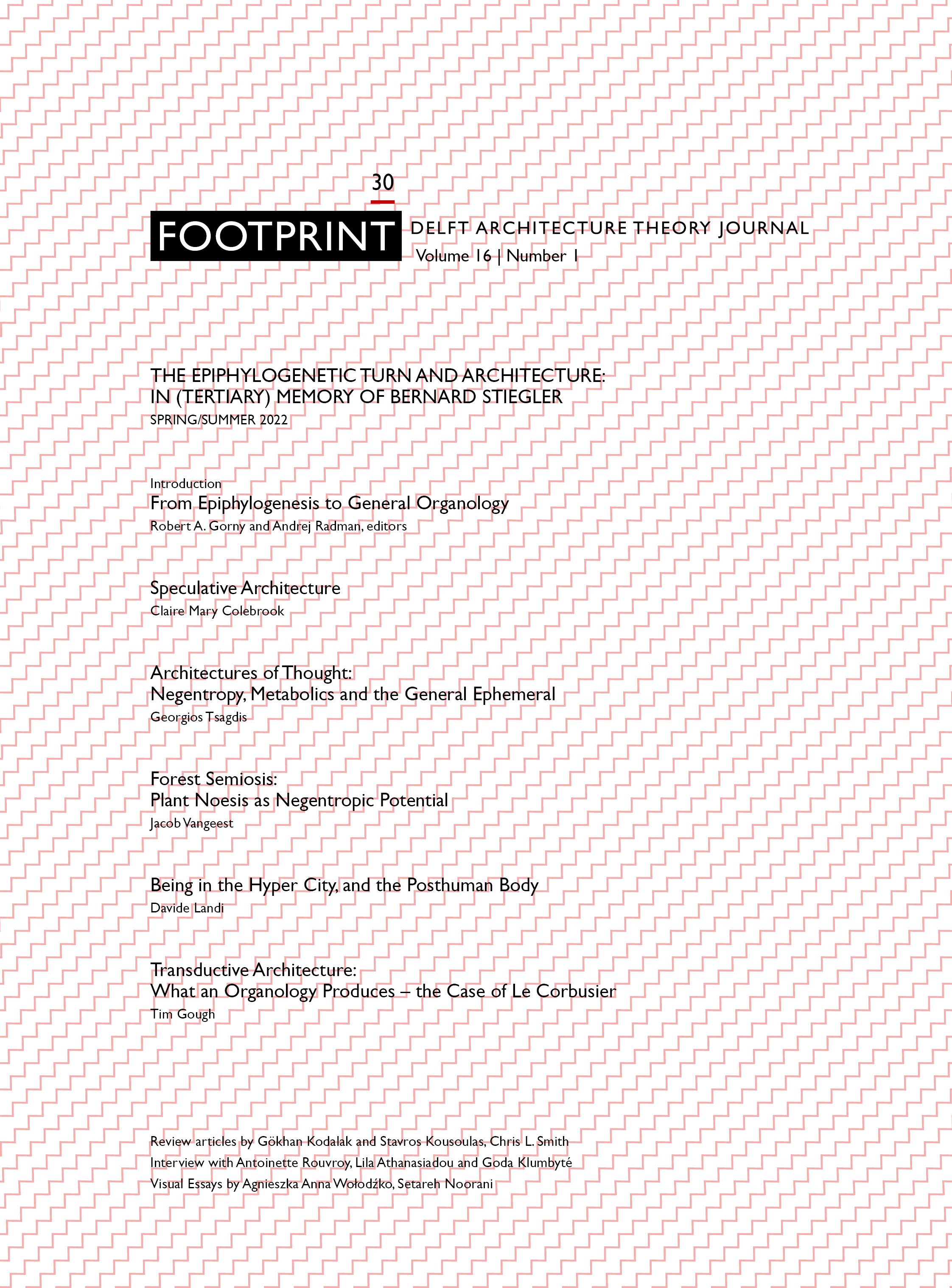Re-Imagining a 'We' Beyond the Gathering of Reductions
Propositions for the Three Ecologies
DOI:
https://doi.org/10.7480/footprint.16.1.5933Abstract
In this article Lila Athanasiadou and Goda Klumbytė engage in a conversation with Antoinette Rouvroy to revisit Guattari’s "Three Ecologies" and discuss their dynamics in and for the digital age. While a lot of the discourses on algorithms and digital future invoke catastrophic imaginaries of totalizing control, this conversation works with a propositional format, teasing out affirmative politics by pointing to spaces of potentiality within the environmental, the social and the mental realm. Starting from the environmental ecology and thinking of data as a waste, Rouvroy discusses planetary exhaustion as the result of the depletion of natural resources, forced labour practices and the assumption that data hold the answers to the problems posed by global capital. Proposing a space for material experimentation, she speculates on the potential of emerging subjectivities that remain irreducible to data flows. Within social ecology, Rouvroy advocates for the urgency to center digital policy as the space in which the new forms of institutions emerge in order to reorient the power of computation towards the commons. Lastly, within the mental ecology, Rouvroy reconceptualizes the legal subject as a performance that operates within the proliferation of asignifying data signs, reimagining a “we” beyond the gathering of reductions.
References
Agamben Giorgio, ‘Du livre à l’écran’, in Le feu et le récit, trans. Martin Rueff (Paris: Payot & Rivages, 2015).
Barad Karen, ‘What Is the Measure of Nothingness? Infinity, Virtuality, Justice’, in Documenta Series 099 (Berlin: Hatje Cantz, 2012).
Baudrillard Jean, L’échange symbolique et la mort (Paris : Gallimard, 1976).
Baudrillard Jean, Simulacres et simulation (Paris: Galilée, 1981).
Brassier Ray, "Mad Black Deleuzianism: On Nick Land”, contribution to the Symposium on Accelerationism, Goldsmith, University of London, Spetember 14th, 2010. https://backdoorbroadcasting.net/2010/09/accelerationism/
Bratton Benjamin H., The Terraforming (Moscow: Strelka Press, 2019).
Deleuze Gilles, ‘Post-scriptum sur les sociétés de contrôle’, L’autre journal no. 1 (1990).
Deleuze Gilles, Critique et Clinique (Paris: Editions de minuit, 1993).
Déotte Jean-Louis, Cosmétiques: Simondon, Panofsky, Lyotard (La Plaine-Saint-Denis : Éditions des maisons des sciences de l’homme associées, 2018), http://books.openedition.org/emsha/224.
Derrida Jacques, Speech and Phenomena And Other Essays on Husser’s Theory of Signs, [Transl. David B. Allison] (Northwestern University Press, 1973).
Derrida Jacques, Specters of Marx (New York and London : Routledge, 1994) [Trans. Peggy Kamuf]
European Commission, ‘Artificial Intelligence Act’ of the European Commission (2021), https://digital-strategy.ec.europa.eu/en/library/proposal-regulation-laying-down-harmonised-rules-artificial-intelligence-artificial-intelligence.
Fisher Mark, “Questioning capitalist Realism. An interview with Mark Fisher
By Matthew Fuller”, Mute, 20 December 2009. https://www.metamute.org/community/your-posts/questioning-capitalist-realism
Fisher Mark, “How to kill a zombie: strategizing the end of neoliberalism”, Open Democracy, July 18, 2013. https://www.opendemocracy.net/en/how-to-kill-zombie-strategizing-end-of-neoliberalism/
Foucault Michel, On The Government of the Living: Lectures at the Collège de France, 1979-1980, (Palgrave Macmillan, 2014). [Transl. Graham Burchell]
Hauptmann Deborah and Radman Andrej, ‘Asignifying Semiotics as Proto-Theory of Singularity: Drawing is Not Writing and Architecture does Not Speak’, Footprint 14 (2014).
Hörl Erich, Sacred Channels: The Archaic Illusion of Communication (Amsterdam: Amsterdam University Press, 2018).
Ito Joichi et al., ‘Resisting Reduction: A Manifesto’, Journal of Design and Science (2017), doi: https://doi.org/10.21428/8f7503e4.
Konings Martijn, Capital and Tome. For a new critique of neoliberal reason, (Stanford University Press, 2018).
Land Nick, “Meltdown”, Abstract Culture, 1 (Coventry: Cybernetic Culture Research Unit 1,1997).
Legendre Pierre, De la société comme texte: Linéaments d’une anthropologie dogmatique (Paris: Fayard, 2001).
Mazzarella William, Santner Eric L. and Schuster Aaron, Sovereignty, Inc.: Three Inquiries in Politics and Enjoyment (University of Chicago Press, 2019).
Nietzschem Friedrich, On the Genealogy of Morality (Hackett Publishiong Company, 1988) [Transl. Maudemarie Clarck and Alan J. Swensen]
Parisi Luciana, ‘La raison instrumentale, le capitalisme algorithmique et l’incomputable’, Multitudes 62, no.1 (2016)
Rouvroy Antoinette, ‘Algorithmic Governmentality and the Death of Politics’, Green European Journal, 9 March 2020, https://www.greeneuropeanjournal.eu/algorithmic-governmentality-and-the-death-of-politics/
Rouvroy Antoinette, Revitalizing Critique Against the Critical Sirens of Algorithmic Governmentality’, conference talk at the 6th ICTs and Society Conference: Digital Objects, Digital Subjects, University of Westminster, London, 20–21 May 2017, https://youtu.be/ezd24NQoqCw.
Rubenfeld Jed, Freedom and Time: A Theory of Constitutional Self-Government (New Haven: Yale University Press, 2001).
Schuster Aaron, ‘The Debt Drive: Philosophical Anthropology and Political Economy’, talk delivered on 17 December 2016 at Fantasies of Capital, a Jnanapravaha Mumbai conference.
Stiegler Bernard, Technics and Time , IV, unpublished draft. [Transl. Daniel Ross]
Stiegler Bernard, Qu’appelle-t-on panser ?1. L’immense régression. (LLL, 2018.) [Trans. Antoinette Rouvroy]
Supiot Alain, Homo Juridicus: On the Anthropological Function of the Law (London: Verso, 2017) [Transl. Saskia Brown]
Tort Patrick, L’intelligence des limites: Essai sur le concept d’hypertélie (Paris: Gruppen, 2019).
Varoufakis Yanis, ‘Techno-Feudalism is Taking Over’, Project Syndicate, 28 June 2021, https://www.project-syndicate.org/commentary/techno-feudalism-replacing-market-capitalism-by-yanis-varoufakis-2021-06.
Downloads
Published
Issue
Section
License
Copyright (c) 2022 Lila Athanasiadou, Goda Klumbyte, Antoinette Rouvroy

This work is licensed under a Creative Commons Attribution 4.0 International License.
- Authors retain copyright and grant the journal right of first publication with the work simultaneously licensed under a Creative Commons Attribution License that allows others to share the work with an acknowledgement of the work's authorship and initial publication in this journal.
- Authors are able to enter into separate, additional contractual arrangements for the non-exclusive distribution of the journal's published version of the work (e.g., post it to an institutional repository or publish it in a book), with an acknowledgement of its initial publication in this journal.





